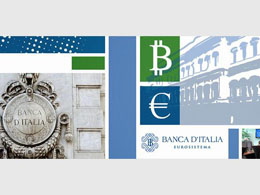
European Central Bank Report Examines Growth In Virtual Currencies
The European Central Bank (ECB) has published a report on virtual currencies that recognizes their dramatic growth in recent years and analyzes some of their dynamics and challenges. Titled "Virtual currency schemes - a further analysis," the 37-page report points out that virtual currencies have risks. However, it notes that currently, bitcoin is used for around 69,000 transactions per day worldwide, compared with a total of 274 million non-cash retail payment transactions per day for the European Union alone. The ECB's 2012 report on virtual currency examined the extent to which virtual....
Related News
At a speech in Rome yesterday, Yves Mersch of the European Central Bank reiterated the bank’s stance on cryptocurrencies from 2012, but warned that such currencies should not be ignored. Essentially, Mersch’s comments were that digital currencies were still too small to be of any consequence at the moment — a key part of the Virtual Currency Schemes report from October 2012, when bitcoins were trading for tens of dollars. “Many media commentators have been wondering what impact these currencies will have on retail payments and even on central banks,” he said. “I agree that virtual currency....
The Central Bank of Italy (Banca d'Italia) is that country's first governmental authority to issue a statement on virtual currencies. It recently published three directives: Warnings on use of virtual currencies (30 Jan 2015). Notice on virtual currencies (30 Jan 2015). Notice of Central Authority for Reporting on virtual currencies (2nd Feb 2015). The "Notice About the use of virtual currencies" (published on the Supervisory Bulletin No. 1, January 2015) is a summary of guidance previously issued by the European Central Bank (ECB), the European Banking Authority (EBA), and the Financial....
The Bank of Greece issued a brief statement on 11th February warning citizens of the potential risks associated with virtual currencies, such as bitcoin. In particular, the bank cautioned that investors should be mindful that losses related to changes in the price of virtual currencies are not protected. A recently released report from the Law Library of Congress, the research arm of the US Congress, suggests that this is the first time the Bank of Greece has issued a statement on virtual currencies. Citing past statements from the European Banking Authority, the release included....
The European Central Bank (ECB) has reiterated its position on digital currencies. In a speech delivered at the at the ECB/Banca d'Italia Workshop on Interchange Fees, Yves Mersch, Member of the Executive Board of the ECB, said digital currencies are still too small to have an impact on retail payments and central banks. Mersch reiterated what the ECB said two years ago in its Virtual Currency Schemes report, published in October 2012. In the meantime digital currencies have gained quite a following, although they are still not even close to what could be described as 'mainstream'. In any....
Regulation of virtual currencies is one of the most interesting topics in the European Parliament. A new report throws light on the technology. The importance of virtual currencies and its underlying blockchain technology is being recognized by the European Union, resulting a favorable outlook towards the cryptocurrency industry by the European Parliament. The recent report published by the European Parliament stands as an evidence of its stance towards virtual currencies. The opinion report on virtual currencies and virtual currency technology was published by the Committee on the....





